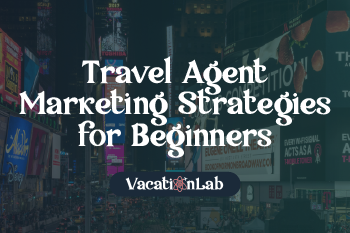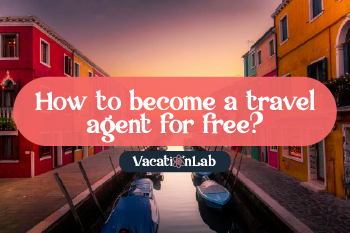We’ve put together a general in-depth guide below on how to become a travel agent. But if you’d rather get answers right away, just click vacationlab.io/join to chat live with our team and learn firsthand how to become a travel agent, and gain access to all our other travel partners as well. Best of all, clicking the link is completely free - no dues or fees from us, ever!
Overview
Ever wanted to help a family book a trip aboard the biggest cruise ship in the world, Icon of the Seas? Or help college graduates take their first-ever trip to Walt Disney World? Or maybe assist a family with kids in having dinner with Elsa in the middle of the Atlantic with Disney Cruise Line? Well, this might be the job for you, friend - and best of all, you can do it from basically anywhere!
As a Travel Agent, you can book dream vacations from the comfort of your home, from a beach resort in the middle of Curaçao, or even from the front row of a roller coaster at Islands of Adventure (*ahem* we don’t recommend that last one). Being a Travel Agent is all about having great communication skills, being helpful, knowledgeable, and feeling great after helping someone set up a trip they’ve been dreaming about for ages!
Stick with VacationLab and have fun reading pro tips on how to become a travel agent. We’ll cover things like:
- Benefits of Becoming a Travel Agent
- Skills Required to Become a Travel Agent
- Tips for Those Starting Out
- Getting Paid
- Why VacationLab might be what you are looking for
- Travel Agent FAQs
Now let’s get started!
Benefits
The Start of a New Career
Every single day, Google tracks people from all over the world who aren’t happy with their current jobs and are looking for something new. Millions of search results show inputs like “how to work for Disney” or “Royal Caribbean jobs.”
I get it, trust me. Many jobs out there are just boring. But being a travel agent in the entertainment industry is way more exciting than putting on a suit and waking up at 7am for a typical office job. Travel agents are becoming more popular than ever, and VacationLab is here to help you turn that dream into reality.
The chance to get a lot of $$$
Some people have what we call a "dream job," and that could definitely be you. As a travel agent, your income will primarily come from the commissions you earn and the types of vacations you book. The best part? You aren’t limited to just one destination. If you specialize in setting up trips for Carnival, you can also book vacations for Royal Caribbean, Disney theme parks, Sandals Resorts, and more.
We won’t sugarcoat it: income can be inconsistent, especially at first. But as you start booking more trips and building your reputation, things become much more exciting. In the first few months, it’s important to set realistic expectations for your new career. You might even consider transitioning gradually from your current job as you learn the ropes and start booking more magical vacations.
Work from Basically Anywhere
Travel agents take the words home office to a whole new level. It’s one of the few jobs where it truly makes sense to work from anywhere, whether that’s your home, a beach in Turks & Caicos, onboard the Disney Wish, or even the Moon. Okay, maybe not the Moon (yet), but you get the idea.
All you need is a laptop and the ability to focus on your clients' needs. As a travel agent, it’s essential to always be available for your clients. You’ll be booking trips for people from all over the world, so even if you’re in Saint Lucia, sipping a Piña Colada, staying connected and assisting your clients as soon as possible is key.
Work Trips (FAM trips) and Special Discounts
Familiarization trips (FAM trips) are a common perk in the travel industry. These are educational trips offered to travel agents at a reduced rate, allowing them to better understand a cruise ship, experience the top attractions at a new theme park, and more. Your agency will provide all the details on timing and availability.
Additionally, travel agents may receive discounts when traveling with major companies like Disney, Sandals, Royal Caribbean, and more. These discounts make personal travel more affordable while also providing valuable opportunities to expand your product knowledge.
One thing to keep in mind is that, to get discounts, you’ll need to show proof of active work, typically in the form of recent bookings. Most travel partners will also require you to have a CLIA card of your own.
Tax Benefits
Let’s be honest, no one loves taxes. However, working as an independent contractor may come with certain tax benefits. You could potentially deduct business expenses such as your home office, research-related travel, and marketing costs. That said, it’s important to consult a tax professional to fully understand your specific situation and obligations.



Skills
As with any job, you need a specific set of skills to thrive as a travel agent. Here are the key skills to focus on and develop as you book more and more vacations for clients worldwide.
A Self-Starter Mindset
While your agency will provide support throughout your travel agent career, success ultimately depends on you. You’ll need to stay organized, seek out clients, and take responsibility for growing your business.
Being a successful travel agent also means staying open to new ideas and industry concepts. You’ll come across terms like “Lightning Lanes,” “Rotational Dining,” and more, but don’t worry! With the right mindset, you’ll pick them up in no time.
Communication Skills
A great travel agent knows how to communicate effectively with their clients. Scratch that, let’s call them guests. After all, you wouldn’t treat a guest poorly, right? Always be open to answering any questions your guests might have, and work on building your charisma to make their experience unforgettable. Being a great communicator also means being a skilled problem-solver. Issues are bound to arise during a vacation, and your guests will look to you for solutions.
You also need to understand the type of guest you’re speaking with. Someone booking a Carnival Cruise might be a young college student looking for a fun getaway, so a more casual tone is likely fine. On the other hand, a Celebrity Cruises guest might be a couple in their 50s who value attention to detail and have specific expectations for their cruise experience.
Problem-Solving Skills
Problems can arise before, during, and after your guests' trips. Maybe they need to change a dining reservation last minute or their flight is delayed, and they need your help to avoid being late for their incredible cruise vacation. A good travel agent is not only attentive before guests book their vacation, but also during and after. Be ready to lend a hand, assist them, and build a loyal client base over time.
Stay Up to Date with the Travel Industry
As a Travel Agent, you will likely work with companies such as Royal Caribbean, Celebrity Cruises, Carnival Cruise Line, Disney, Sandals, and more. To succeed, you’ll need to research and understand these big companies, as each has unique features that set them apart.
For example, Disney Cruise Line offers rotational dining, meaning guests dine at a different included restaurant each night of their cruise. Celebrity Cruises features select ships with the Magic Carpet, a moving platform that transforms into a restaurant. Norwegian Cruise Line has ships with go-kart tracks on the top deck… yes, really. It’s a wild but incredibly fun industry, and knowing the details of what you’re selling is key.
When it comes to theme parks, Disney and Universal have distinct differences. Disney is widely known for its family-friendly atmosphere, with parks like Magic Kingdom designed to create magical experiences for all ages. Meanwhile, Universal’s Islands of Adventure is often considered one of the best theme parks in the world for adults and teenagers, thanks to its awesome rollercoasters like Hagrid’s and VelociCoaster.
As a travel agent, you might need to study and learn about things like:
- What each cruise line, theme park or beach resort offers that is truly unique
- Main itineraries and Destinations of each cruise line
- The best restaurants available in a destination of choice
- The best rides at a specific theme park
- Some of the most romantic Sandals Resorts
- …and more!
Leverage Your Social Media Presence
As a travel agent, it’s important to get your name out there. Engage with people on forums like Reddit, connect with potential clients, and stay informed about the companies you’re booking for. Use platforms like Instagram, X (formerly Twitter), Pinterest, Facebook, and others to communicate, share your work, and build your online presence. Talk to your friends and family as well, and ask them to help you out when possible!
Patience is Key
Being a travel agent requires a lot of patience. Sometimes, you may spend hours talking with a client, only for them not to book a trip. That’s perfectly fine. Always stay polite and helpful, after all, their questions will likely come up with other clients, and you'll be ready with answers at the tip of your tongue.
Patience is also important when it comes to earning your commissions. For example, some VacationLab agents are working on trips for 2026, meaning it may be a year before they receive payment. This is why building your brand is just as important as booking trips. When you have a strong brand, your income becomes more consistent, regardless of whether you get paid next week or a year from now.
Remember, if you're just starting out, it may take some time to start earning a steady income. Stay patient, and trust the process.
Finding a Host Agency
Best Host Agency
This guide is designed to help you become an outstanding travel agent, and we wish you a rewarding journey ahead. Finding the right agency can be challenging, but you can always count on VacationLab. Here’s why we might be the perfect fit for you:
- We’re open-minded, and it doesn’t matter if you have prior experience as a travel agent or not.
- We offer a fun and relaxed interview process to help you feel comfortable and get to know you better.
- We have our very own Travel Dashboard called SORS to help you manage your bookings and travel rewards.
- We have our very own Mastering Travel Social Media course to help out our fellow travel advisors.
- We provide a commission split starting at 70%.
- We have hundreds of guides and reviews on our sister site, Famvia, covering the biggest cruise companies, theme parks, and beach resorts.
- Most importantly, we’re always ready to lend a helping hand and listen to you.
Have fun and enjoy this amazing new world!
Tips for those starting out
This section will cover essential tips to keep in mind when looking for a travel agency or when you're ready to become a travel agent. Let’s take a look:
Learn How Travel Commissions Are Paid
Travel agents typically earn their income through commissions, rather than a fixed salary. This means your earnings are directly tied to the vacations you book for clients, and there's no guaranteed weekly income.
Commission-based pay can be both exciting and challenging. While you have the potential to earn thousands of dollars in a single week, there are also moments of uncertainty. That’s why building your brand and cultivating a large client base is so important.
As a travel agent, you'll receive a percentage of each travel booking. A "travel booking" refers to the total cost of the trip you arrange, and we will talk more about that soon.
Research Potential Host Agencies for Travel Agents
There are thousands of travel agencies around the world. Some are great, while others may not be as reliable. The most important thing when choosing a travel agency is learning to spot red flags that could indicate it’s not the right fit for you. Red flags include:
- Travel agencies that charge you to join them
- Travel agencies that hire you without an interview or are too eager to bring you on board
- Travel agencies that offer a low commission split to travel agents (typically less than 70% net commission on travel bookings)
- Travel agencies with poor reviews or a bad reputation online
Become an expert in your destination of choice
Let’s say you want to become a cruise travel agent: are you starting with Disney Cruise Line or maybe Princess Cruises? Or are you more interested in Norwegian Cruise Line or Viking? There are tons of cruise lines out there, each with its own pros and cons that you should be familiar with.
No worries if you don’t know much about a specific company yet. We all have to start somewhere, after all! That’s where a little research comes in handy.
VacationLab's sister site, Famvia, offers free guides on every major cruise line, providing detailed information in a fun and easy-to-understand way. You can learn a lot there, with guides and articles covering topics like:
- Planning a Cruise on Disney Cruise Line
- Dining Options Onboard Royal Caribbean Cruise Line
- Activities Onboard Norwegian Cruise Line
- Room Options Onboard Carnival Cruise Line
- Itineraries and Destinations for MSC Cruise Line
- Icon of the Seas Review
- Norwegian Aqua Preview
Famvia offers a wealth of information on most cruise lines. In fact, for every major cruise line, you’ll find five in-depth guides covering trip planning, stateroom options, dining, activities, and itineraries.
Famvia also has a ton of content related to theme parks, like:
- Planning a Trip to Walt Disney World
- Magic Kingdom Ride Strategy
- The Top Kid-Friendly Rides at Islands of Adventure!
- Grand Floridian Resort & Spa Review
- Star Wars: Rise of the Resistance Review
- Harry Potter and the Escape from Gringotts Review
Each of Famvia’s reviews features its own ratings, along with bullet points highlighting the pros and cons of each hotel or attraction. You won’t find this level of detail anywhere else on the internet!
Famvia also specializes in beach resorts, particularly Sandals and Beaches Resorts. You can find guides to every single Sandals and Beaches resort by following this link.
Prepare for your Interview
You need to prepare for your interview on the big day. You know what that means, right? Research not only the travel agency you’re applying to but also the destination you are interested in (*cough* check the links above). Stay calm during the interview, ask questions, and demonstrate that you understand the destination you’re looking for.
Many agencies offer incentives to their clients, such as onboard credits for cruises or gift cards. These incentives, however, are deducted from the commission before it's split between the agency and the agent. It's important to understand how these deductions work at your chosen agency, so be sure to ask about them before you join.
Complete Travel Agent Training Courses
Most companies out there have their own training courses that you need to complete before you start booking. You need to register with them and then begin working. For example, Carnival has the Loyalty Rocks Training Program that you can access here, and Celebrity Cruises offers the Five Star Academy Training course, which you can access here. Completing these courses is essential and provides you with special certificates that can improve your career as a travel agent.
CLIA Training
You might also want to look into CLIA (Cruise Lines International Association) and complete specific courses there. CLIA certification brings numerous benefits, as you can see here.



Getting Paid
Commission Split
Travel agencies and agents work together, meaning you'll split your commissions with the agency you're working for. It's important to understand how commission splits work with the agency of your choice. New travel agents might start with a 50/50 split, but as they gain more bookings, they can increase their share to something like 60/40 or 70/30.
At VacationLab, everyone starts at 70% and can earn up to 85%.
Commission Payout
In most cases, you’ll receive your commission after the company receives the final payment. For most cruise lines, this occurs after the trip is completed. This ensures you’re paid only if the trip isn’t canceled at the last minute due to unforeseen circumstances, such as a hurricane.
Planning Fees
Some travel agents charge planning fees to clients in addition to earning commissions, if permitted by their host agency. While these fees can help offset the time spent researching and planning trips, deciding whether to charge planning fees is typically a personal business choice, and practices can vary between agencies. At VacationLab, we generally recommend against charging specific travel planning fees.
Travel Agent Salary
It’s incredibly hard to put a number on how much a travel agent makes per year. This depends on the number of companies you work for, the number of bookings you make, whether you are working full-time or not, and many other variables. Glassdoor states that the estimated total pay for a travel agent is $85,472 per year, with an average salary of $55,370 per year. The average salary for a travel agent is $15.23 per hour in the United States.
These numbers are estimates, and you can earn anything from $10,000 per year if you focus solely on niche destinations like LEGOLAND, or up to $250,000 per year if you aim to become the Lionel Messi of travel agents.
Training
Free Stock Library
How to become Travel Agent FAQs
While previous experience can be helpful, it’s not required. Most cruise lines offer excellent training, and your passion for travel is what matters most. Do some research, watch YouTube videos, connect with us at VacationLab, and soon you'll be a cruise expert!












